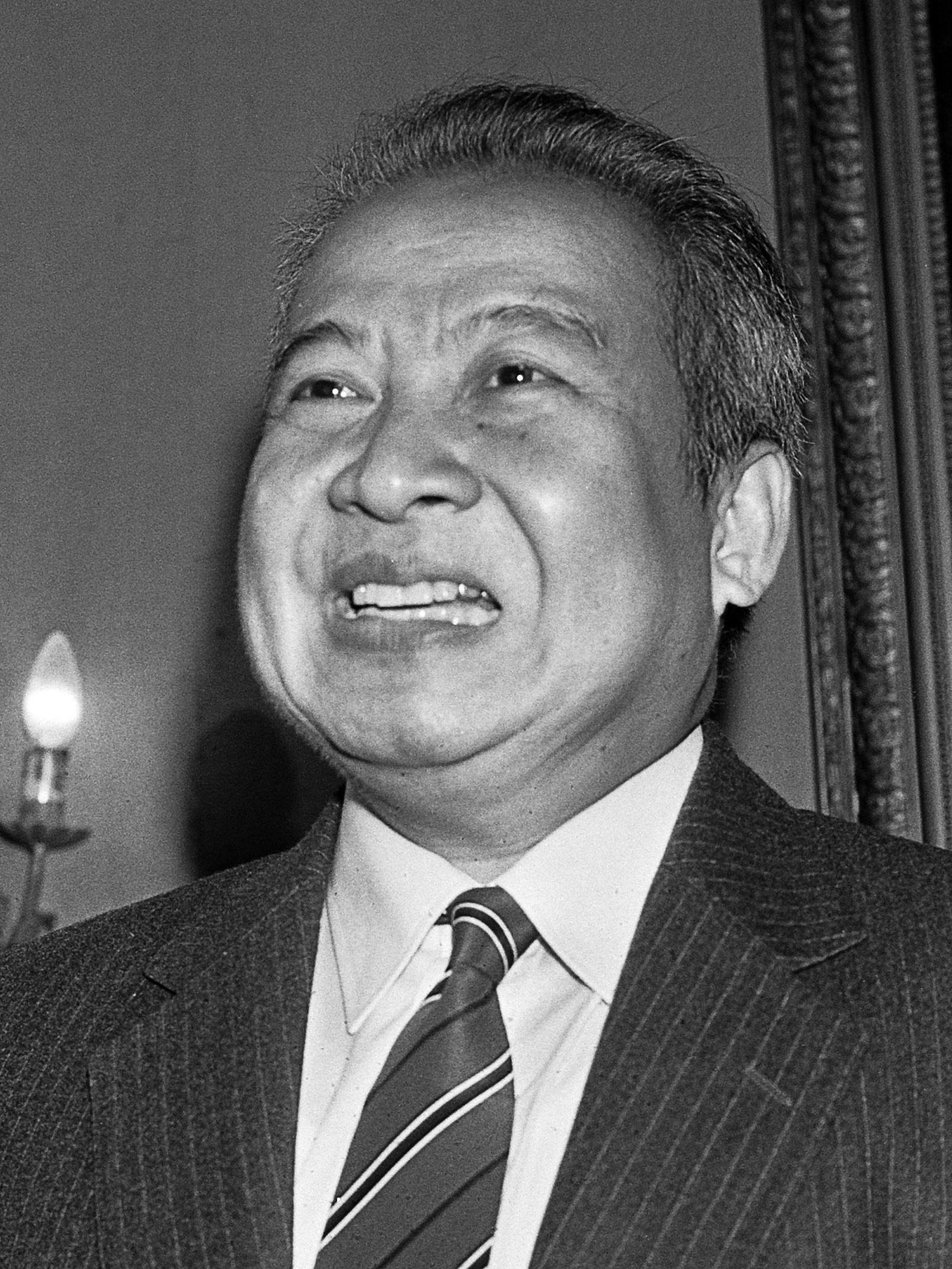„Poligamia była u nas dozwolona.”
Źródło: Tadeusz Pasierbiński, Monarchie świata. Poczet rodów królewskich i książęcych, wyd. Iskry, Warszawa, 2002, ISBN 83-207-1705-1, s. 432
Preah Bat Samdech Preah Norodom Sihanouk Varman – syn króla Norodoma Suramarita i królowej Sisowath Kossamak, król Kambodży. Panował w latach 1941-1955 i 1993-2004, ponadto był głową państwa w latach 1960–1970, 1975–1976 i 1991–1993. Z powodu ciężkiej choroby abdykował 7 października 2004.

„Poligamia była u nas dozwolona.”
Źródło: Tadeusz Pasierbiński, Monarchie świata. Poczet rodów królewskich i książęcych, wyd. Iskry, Warszawa, 2002, ISBN 83-207-1705-1, s. 432
Źródło: Tadeusz Pasierbiński, Monarchie świata. Poczet rodów królewskich i książęcych, wyd. Iskry, Warszawa, 2002, ISBN 83-207-1705-1, s. 434
Źródło: Souvenirs doux et amers, cyt. za: Tadeusz Pasierbiński, Monarchie świata. Poczet rodów królewskich i książęcych, wyd. Iskry, Warszawa, 2002, ISBN 83-207-1705-1, s. 432
„Jeśli oni [Czerwoni Khmerzy] nie będą mnie już potrzebować, wyplują mnie jak pestkę z wiśni.”
Źródło: wywiad udzielony Orianie Falacci 12 sierpnia 1973; cyt. za Adam W. Jelonek, Kambodża, Warszawa 2008, s. 136.
„Wszyscy Khmerowie są moim dziećmi.”
wypowiedziane w 1963.
Źródło: Maria Kruczkowska, Umarł król – jedna z najbardziej kontrowersyjnych i fascynujących osobistości XX w., wyborcza.pl, 15 października 2012 http://wyborcza.pl/1,75477,12676537,Umarl_krol___jedna_z_najbardziej_kontrowersyjnych.html
o Pol Pocie
Źródło: Simon Sebag Montefiore, Potwory. Historia zbrodni i okrucieństwa, tłum. Jerzy Korpanty, wyd. Świat Książki, Warszawa 2010, ISBN 9788324715480, s. 279.
„Moje przygody miłosne zapełniały kronikę towarzyską.”
Źródło: Tadeusz Pasierbiński, Monarchie świata. Poczet rodów królewskich i książęcych, wyd. Iskry, Warszawa, 2002, ISBN 83-207-1705-1, s. 432
Radio adress (January 13, 1953), as quoted in Philip Short (2004) Pol Pot: The History of a Nightmare, page 83.
Said during his exile in Peking, as quoted by Oriana Fallaci (June 1973), Intervista con la Storia (sixth edition, 2011). pages 112-113.
Interviews
Said during his exile in Peking, as quoted by Oriana Fallaci (June 1973), Intervista con la Storia (sixth edition, 2011). page 128.
Interviews
Said during his exile in Peking, as quoted by Oriana Fallaci (June 1973), Intervista con la Storia (sixth edition, 2011). page 103.
Interviews
As quoted by David Ablin and Marlowe Hood (March 14, 1985), "The Lesser Evil: An Interview with Norodom Sihanouk" http://www.nybooks.com/articles/archives/1985/mar/14/the-lesser-evil-an-interview-with-norodom-sihanouk/?pagination=false, The New York Review of Books.
Interviews
On Zhou Enlai, said during his exile in Peking, as quoted by Oriana Fallaci (June 1973), Intervista con la Storia (sixth edition, 2011). page 109.
Interviews
Speech to the Council of the Throne (June 4, 1952), as quoted in Philip Short (2004) Pol Pot: The History of a Nightmare, page 76.
Speeches
Said during his exile in Peking, as quoted by Oriana Fallaci (June 1973), Intervista con la Storia (sixth edition, 2011). page 113.
Interviews
Said during his exile in Peking, as quoted by Oriana Fallaci (June 1973), Intervista con la Storia (sixth edition, 2011).
Interviews
Said during his exile in Peking, as quoted by Oriana Fallaci (June 1973), Intervista con la Storia (sixth edition, 2011). page 128.
Interviews
Secret memorandum drafted for the American and British legations (1953), as quoted in Philip Short (2004) Pol Pot: The History of a Nightmare, pages 92-93.
Speeches
Said during his exile in Peking, as quoted by Oriana Fallaci (June 1973), Intervista con la Storia (sixth edition, 2011). page 103.
Interviews
Said during his exile in Peking, as quoted by Oriana Fallaci (June 1973), Intervista con la Storia (sixth edition, 2011). pages 108-109.
Interviews
Reaction to two Buddhist orders sympathising with communist rebels (1952), as quoted in Philip Short (2004) Pol Pot: The History of a Nightmare, page 84.
Said during his exile in Peking, as quoted by Oriana Fallaci (June 1973), Intervista con la Storia (sixth edition, 2011). page 126.
Interviews
Said during his exile in Peking, as quoted by Oriana Fallaci (June 1973), Intervista con la Storia (sixth edition, 2011). pages 105-106.
Interviews
Said to presidential emissary Chester Bowles (January 10, 1968), as quoted by Henry Kissinger (2003) Ending the Vietnam War: A History of America's Involvement in and Extrication from the Vietnam War, page 67.
As quoted by Haing S. Ngor (1987) Surviving the Killing Fields, pages 46-47.
Speeches
On the USA, said during his exile in Peking, as quoted by Oriana Fallaci (June 1973), Intervista con la Storia (sixth edition, 2011). page 112.
Interviews
Said during his exile in Peking, as quoted by Oriana Fallaci (June 1973), Intervista con la Storia (sixth edition, 2011). page 113.
Interviews
Stated two months (May 13, 1969) after American bombings in Cambodia began, as quoted by Henry Kissinger (2000), Years of Renewal, page 498.
Said during his exile in Peking, as quoted by Oriana Fallaci (June 1973), Intervista con la Storia (sixth edition, 2011).
Interviews
Said during his exile in Peking, as quoted by Oriana Fallaci (June 1973), Intervista con la Storia (sixth edition, 2011). page 116.
Interviews
On the USA, said during his exile in Peking, as quoted by Oriana Fallaci (June 1973), Intervista con la Storia (sixth edition, 2011). page 112.
Interviews